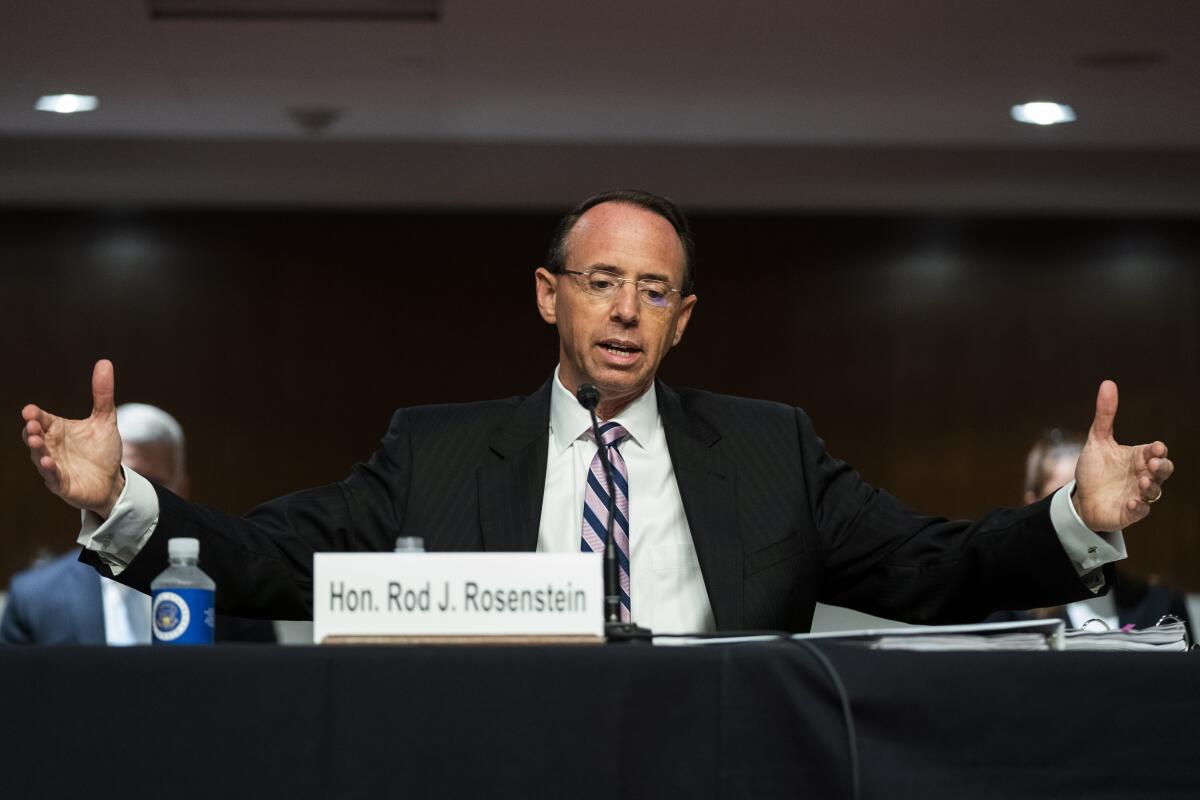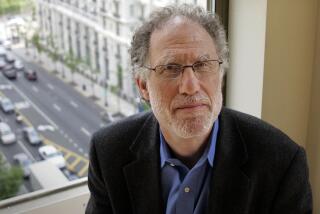Rod Rosenstein concedes mistakes in Russia investigation
- Share via
WASHINGTON — Former Deputy Atty. Gen. Rod Rosenstein, who supervised the investigation of Russian election interference, conceded to a Senate committee Wednesday that law enforcement made mistakes during the high-stakes probe, particularly with the surveillance of Carter Page, who briefly served as an advisor to President Trump’s 2016 campaign.
The FBI obtained a warrant focused on Page from the Foreign Intelligence Surveillance Court, and a Justice Department inspector general’s report later found “basic and fundamental errors” in the process. Rosenstein said he would not have approved a renewal application for the warrant if he had known of the problems.
But Rosenstein largely defended the probe at the Senate Judiciary Committee hearing, giving his first testimony since special counsel Robert S. Mueller III wrapped up his investigation in March 2019 — and since Trump and his allies launched a campaign to undo Mueller’s work and undermine his conclusions about Moscow’s role in the 2016 election.
Rosenstein expressed sympathy with Trump’s anger over the probe, which cast a cloud over Trump’s White House for more than two years, although he flatly denied that it was a “hoax,” as Trump has repeatedly claimed, or corrupt.
“I do not consider the investigation to be corrupt, but I certainly understand the president’s frustration, given the outcome,” he said.
Rosenstein defended his decision to appoint Mueller, a former FBI director, as special counsel in 2017, saying it was “the best way to complete the investigation” that the FBI previously had begun, and to “promote public confidence in its conclusions.”
The White House said Rosenstein’s testimony was further proof that the investigation was fatally flawed.
“It was a travesty,” said Trump’s press secretary, Kayleigh McEnany. “We hope to get to the bottom of this.”

Senators largely rehashed familiar arguments, with Republicans insisting the special counsel investigation was illegitimate and Democrats defending it as fully warranted.
“There are people on our side of the aisle who believe that this investigation, Crossfire Hurricane, was one of the most corrupt, biased criminal investigations in the history of the FBI, and we would like to see something done about it,” said Sen. Lindsey Graham (R-S.C.), the committee chairman, using the former FBI code name for the Russia probe.
Graham said his panel would take a “hard look” at Mueller’s work, which he described as an “abuse of power,” and he sharply questioned Rosenstein about whether evidence showed Trump’s campaign had conspired with Moscow.
“There was no ‘there’ there in August 2017,” when Rosenstein issued a secret memo outlining the scope of Mueller’s investigation, Graham said. “Do you agree with that general statement or not?”
“I agree with that general statement,” Rosenstein responded.

When the memo was issued, Mueller had yet to file his first criminal charges, however. His work eventually produced charges or convictions against 34 people.
“The president and his allies have been trying to rewrite the special counsel’s findings since the day they were released,” said Sen. Dianne Feinstein (D-Calif.), the ranking member of the committee. “But ignoring or excusing what happened in 2016 is really very dangerous. It puts American democracy and national security at risk.”
In his final report, Mueller documented how Trump’s campaign welcomed Moscow’s interference in the campaign, which included releasing hacked Democratic Party emails and spreading disinformation on social media. But he did not establish a criminal conspiracy between any Americans and Russians.
The special counsel’s office also investigated whether Trump obstructed justice by trying to interfere with the Russia investigation. Mueller ultimately did not say whether the president broke the law but said the evidence “does not exonerate him.”
The testimony comes against a backdrop of growing pushback from the Trump administration to Mueller’s work.
Atty. Gen. William Barr asked a federal judge last month to drop the government’s case against Michael Flynn, Trump’s former national security advisor and the only former White House official charged in the probe.
Flynn pleaded guilty to lying to federal agents but later claimed he was innocent, and the judge has not issued a ruling on Barr’s request.
In recent weeks, senior intelligence officials have declassified documents involving the origins of the Russia investigation, fueling Trump’s claims that he was the target of a sinister and vague conspiracy that he calls “Obamagate.”
The president also has mused about pardoning Roger Stone, his longtime political advisor, who was convicted of lying to Congress and witness tampering.
The special counsel investigation ensnared several members of Trump’s inner circle, including his former lawyer, Michael Cohen, and his former campaign chairman, Paul Manafort.
Cohen was sentenced to three years in prison for various crimes, including lying to Congress about Trump’s efforts to build a skyscraper in Moscow during the presidential campaign.
Manafort was sentenced to more than seven years for tax evasion, bank fraud and conducting an illegal lobbying campaign on behalf of the former Russia-backed government in Ukraine.
Both men are now under home confinement as federal prisons release some vulnerable inmates to reduce the risk of infection from the coronavirus.
More to Read
Get the L.A. Times Politics newsletter
Deeply reported insights into legislation, politics and policy from Sacramento, Washington and beyond. In your inbox three times per week.
You may occasionally receive promotional content from the Los Angeles Times.











